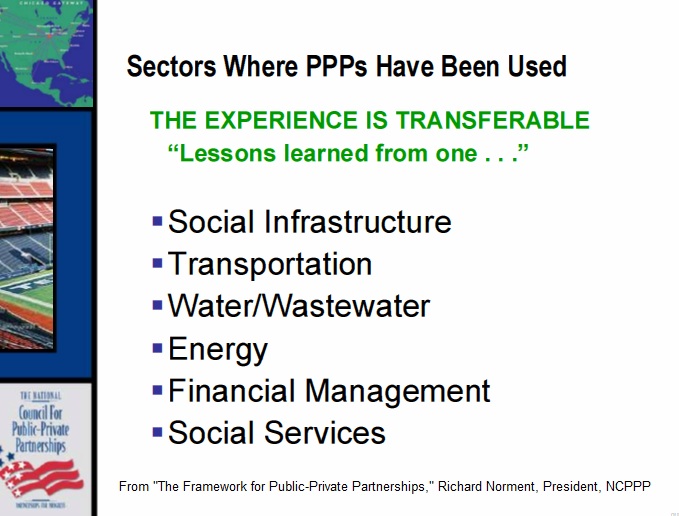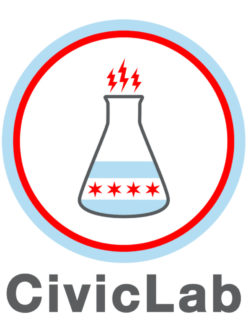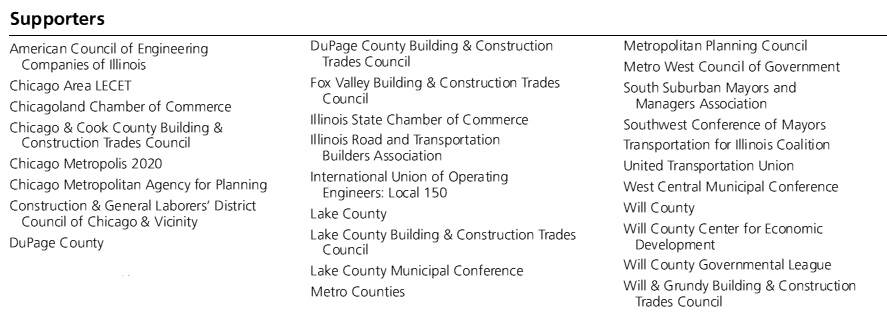On June 24, 2011 at The Hyatt Lodge on the corporate campus of McDonald’s in Oak Brook, the other wingtip dropped.
It was there that a very oddly named conference took place. “It’s Not Privatization: Implementing Partnerships in Illinois” was organized by The National Council for Public-Private Partnerships and the Chicagoland Chamber of Commerce with assistance from the Metropolitan Planning Council. The conference revealed the corporate sector’s designs on the commons in Illinois.
Chicago, Cook County and Illinois combine to produce an epicenter of corruption, insider deals and arrogant flouting of open government mandates. I’m an activist based in Chicago and a good-government reformer and practitioner of grass roots organizing and community development. I have been fighting the Chicago Machine for decades.
In 2005 Mayor Daley assigned the Skyway Bridge that connects us to Indiana to a consortium that is owned by Spanish and Australian companies. That deal got the city $1.83 billion for a 99 year lease. One analysis of the deal shows that the new owners stand to reap between $5 to $15 billion, depending on the traffic flow and how high they jack up the tolls.
In 2009 Mayor Daly gave our parking meters to a group of investors led by MorganStanley which included the oil-rick sheikdom of Abu Dhabi. We got $1.15 billion for a 75 year lease. The investors will earn in the vicinity of $11.6 billion over the life of the deal. Parking rates have skyrocketed, meters appeared in placed that had never been metered and the hours for metered parking were extended. The citizens howled, the press heaped scorn and the five aldermen who voted “No” on the deal are all now regarded as heroes.
In June of 2008 Chicago was selected as one of the four finalist cities in the race to get the 2016 Olympics. I was one of the organizers of a coalition of concerned citizens who fought the bid, No Games Chicago. Our research showed us that the games heap debt on host cities, displace the poor and working class families from venue neighborhoods and wreck havoc on the environment. In essence, becoming a host of the Olympics causes your entire city to be privatized for seven years. Local laws and representative government is superseded and trumped by the needs and dictates of the Olympic organizers.
In each case, all the major planning bodies, civic watchdog groups and various park and public watchdogs were silent. Many supported these privatization schemes.
In addition to these schemes, Mayor Daley was also a master spawner of tax increment finance districts (TIFs). Chicago has 160 of them and in 2009 they siphoned $519 million in property taxes away from the units of government that rely on them for operation. TIFs are supposed to be used to jump start development in “blighted” communities. But in Chicago they constitute a giant slush fund controlled by the Mayor and a few powerful aldermen. Public dollars from the TIF program have gone to such corporate giants as United Airlines, MillerCoors, Quaker Oats, Willis Insurance and the Chicago Mercantile Exchange. In addition, hundreds of millions of dollars have flowed to private developers with no oversight, accountability or citizen input.
Mayor Daley also hatched Renaissance 2010 in 2004 to create 100 new schools outside of the public school system. Two of the creators of the Chicago Small Schools Workshop critique the plan as having “more in common with the erosion of public space, with the ‘ownership society,’ than it does with democratic education.” Read their analysis here.
The Skyway, Renaissance 2010, the parking meters, the 2016 bid and the march of the TIF program – they all constitute the first wingtipped shoe that has dropped on the commons in Chicago.
The potential future for the commons here and across Illinois was revealed at this conference. A few other local activists and I attended this conference and, as the presentations unfolded, I began to see how business, labor and legislators were lining up to assault the commons with the complicity of civic planning groups that are loaded with staff and board members with deep connections to Mayor Daley and the Chicago business community. You can see the presentations for yourself here.
The conference was underwritten by 14 major corporations. The Gold Sponsors included Veolia Water. In their own words, “With a workforce of 96,260 in 67 countries and revenue of €12.128 billion in 2010, Veolia Water is the leading global operator of water services. In a world of demographic expansion and growing urbanization, we meet our clients’ needs by fostering close local relationships that are conducive to sustainable water management.” The other Gold Sponsors were Lochner MMM Group – “The Lochner MMM Group is dedicated to bringing its worldwide public-private venture experience to the U.S. infrastructure market;” Weston Solutions – “Weston Solutions, Inc. delivers integrated environmental, sustainability, property redevelopment, energy, and construction solutions;” and Wight – “As a leader in Integrated Solutions for the built environment, Wight & Company is one of only a few firms that possess comprehensive design and construction capabilities in-house.”
The conference started with a summary of Illinois House Bill 1091, “The Public Partnership for Transportation Act,” by one of its chief sponsors, Rep. Elaine Nekritz (D-Des Plaines). Basically, this bill allows – for the first time – the building and operation of roads and tollways by private companies in Illinois. You can listen to her explanation of the bill here.
Although he did not speak at the conference, Peter Skosey, the Vice President of the Metropolitan Planning Council, was credited with shepherding this bill though a five-year revision process that has resulted in its current form and acceptance by a wide range of powerful players. Here is a partial list:
All through the presentations I detected three dominant themes that will frame the presentation of these policies to the public.
First – government at all levels of operation is broke. Local government is broke, state government is broke and there is no possibility or appetite for raising taxes. The implication is that there is no way for government to build a new Hoover Dam or other long-lasting, large scale or even small-scale project for the public good.
Second – government is stupid and incapable of innovation and delivering needed services and facilities efficiently and effectively. Big business is offered as the only source of innovation, efficiency and smart operation. (Of course, no mention was made of the global financial melt-down brought on by these same companies and that the public sector – the taxpayers – had to bail them out to the tune of trillions of dollars)
Third – Because the people of Chicago and Illinois have been burned badly by privatization deals, we will not be hearing that term used in these debates. Instead, we will hear the term “public-private partnerships” applied to these deals involving public assets.
You can hear these arguments unwind in the presentation by the President of the National Council for Public-Private Partnerships, Richard Norment, “The Framework for Public-Private Partnerships vs. Privatization.” Listen to his remarks here.
Despite the rhetoric being unleashed at this conference, to my mind privatization is what happens when we transfer control of public assets, infrastructure and services into the private sector which then operates them for a profit. The public sector is responsible for the creation and care of assets and services that benefit all. Somehow we have arrived a place where the very nature of what is “public” is under attack.
Privatization or public-private partnerships – the bottom line is always the bottom line. Who controls what asset or service and who profits from it? At this conference one could see all the players coming into alignment, testing their talking points and sharing strategies for selling these newly named schemes to the public.
Perhaps the most revealing exchange occurred between Robert Schillerstrom, of Ice Miller, LLP and Thomas Villanova, President of the Chicago & Cook County Building & Construction Trades Council. Mr. Schillerstrom is a former President of the DuPage County Board whose firm works on privatization deals. He talked about the need to sell these deals to the public. “You have to have a campaign,” he said. Mr. Villanova agreed and then cited his experience as a board member of the 2016 Olympic bid committee. He said that in order to counter all “the B.S.” that was out there, the 2016 Committee visited 50 wards in 50 days and that after the visits, public opinion was completely turned around. I almost fell out of my chair. As one of the organizers of No Games Chicago (and the chief purveyor of the B.S. about the bid he found so objectionable) we had representatives at every one of those 50 meetings. I can say without fear of contradiction that the people attending those meetings were angry and 95% of the public comments were critical and derisive of the bid. A few weeks after the last such dog and pony show a Chicago Tribune poll showed support for the games had plummeted to 47% (from 67% in February) and that 84% opposed any public funds being used to pay for the games. You can listen to this exchange here.
What was also very troubling was the statement from a number of speakers that the privatization of roads in Illinois is only the beginning. One slide listed public water, hospitals and schools as candidates for privatization.
 It seems that the same legislators, law firms, banks, construction companies and policy minds that brought us the parking meter deal (which many speakers praised from the podium!) and the 2016 Olympic bid are now behind privatization on a new and massive scale. Labor unions are backing this trend because they need work for their construction trades and as long as union labor is used in these projects or a prevailing wage is paid workers, they don’t care what happens after the projects are completed.
It seems that the same legislators, law firms, banks, construction companies and policy minds that brought us the parking meter deal (which many speakers praised from the podium!) and the 2016 Olympic bid are now behind privatization on a new and massive scale. Labor unions are backing this trend because they need work for their construction trades and as long as union labor is used in these projects or a prevailing wage is paid workers, they don’t care what happens after the projects are completed.
The Powers That Be have the money and means to frame these scams to their advantage. They are already re-writing history and calling the parking meter fiasco an unappreciated master stroke that is simply the victim of bad publicity.
No one at this conference revealed the profit margins on these deals. No one talked about the stories of privatization gone sour in jurisdictions in America and elsewhere. No one asked where the line should be drawn in parceling out public assets, public services and public infrastructure.
We are going to have get organized to stop the pawning of our public assets to private interests for a song. Defenders of the commons – unite!

